![]()
Tuesday, May 26, 2015 | By Rob Harris
RTE, Ireland’s monopolistic public service broadcaster, ran a series of news reports by veteran RTE journalist Robert Shortt, relating to the current difficulties that the people of Gaza experience, in the aftermath of ‘Operation Protective Edge’, the 2014 war between Gaza’s belligerent groups and Israel.
The most detailed report, ‘Inside Gaza’, was broadcast on Prime Time, RTE’s premium current affairs programme, on May 7th 2015 (RTE’s Internet player May 8th date is incorrect). The segment begins at 9:57 in the Internet Player. Robert Shortt’s visit to Gaza was also featured in radio programming (cf. World Report, Radio One, May 3rd) and in RTE’s news articles.
To summarise, the Prime Time report asserts that a humanitarian crisis is on the horizon, due to a lack of promised international donations and Israel’s embargo. Shortt reinforces the latter as the primary reason for Gaza’s weak recovery, and he suggests little reconstruction occurred after prior wars. There is no mention that Israel has supplied large amounts of construction materials, including cement. Shortt presents the stance that Hamas has diverted cement and steel, to build tunnels, as an Israeli claim rather than fact, even though Hamas acknowledges it. There is no mention of Egypt’s embargo in the reports.
Shortt repeatedly used the word ‘attack’ in relation to the findings of the UN Board of Inquiry report into the incidents at seven UN schools. This is a wholly misleading assertion, as the report does not make findings of intent to harm and kill in the schools inspected. In fact, the sole finding of intent in the UN report assertes that the injury and death caused at one school was in error whilst pursuing terrorists. Shortt also appeared to infer that the IDF purposely targets civilians, when he spoke of “the shelters where hundreds [of civilians] gathered only to come under attack once more.”
To Shortt’s credit, he did allow some voice to Israeli views, with the interview of two Ìsraeli individuals in the middle of the segment, which provided some perspectival balance with the opinions of those Arab-Palestinians interviewed. However, his narrational voice, which carries greater authority for viewers, provided a prejudicial account, belying the superficial sense of balance their voices bring. Indeed he went as far as to undermine the views of the of two Ìsraelis featured, by broadly accusing Israeli people of being narrow-minded, and caring little for the welfare of Arab-Palestinian children:
“On the other side of the border, everything is seen through the prism of the threat posed to Israel, including attacks on [Gaza’s] UN schools.”
It would not be unreasonable to argue that the report breaches the codes of the Broadcasting Authority of Ireland. The BAI’s ‘Code of Fairness, Objectivity & Impartiality In News and Current Affairs’ states that:
“Views and facts shall not be misrepresented or presented in such a way as to render them misleading. Presenters should be sensitive to the impact of their language and tone in reporting news and current affairs so as to avoid misunderstanding of the matters covered.” (Page 11, section 19)
The article ‘An analysis of media and NGO narratives on present circumstances in Gaza’ provides an in-depth study of the many inaccuracies in Shortt’s reportage from Gaza.
The Middle East Children’s Alliance
Shortt’s reports focus on the suffering of children, with extended commentary by Dr. Mona el-Farra, of the Middle East Children’s Alliance (MECA).
MECA is reported to have funded the International Solidarity Movement (ISM), which has a record for promoting and giving active terrorists cover. One might think MECA is soft on terrorism, but it appears to be even worse than that! El-Farra, MECA’s Director of Gaza Projects, asserted that MECA refused funding from USAID because (to quote NGO Monitor):
“it came with the condition that they promise “not [to] give any help or any aid whatsoever for the families of the militiamen, or their relatives, or anyone related to ‘terrorist attacks’” because “we consider it resistance”.”
MECA’s founder, Barbara Lubin, was caught telling a story that comes across as a modern day equivalent of an anti-Semitic blood-libel, which she latterly distanced herself from, and MECA has failed to verify:
“I met a mother who was at home with her ten children when Israeli soldiers entered the house. The soldiers told her she had to choose five of her children “to give as a gift to Israel”. […] Then these soldiers murdered five of her children in front of her. The concept of “Jewish morality” is truly dead. […] We have to end the Zionist state. We’ve got to charge the war criminals. We have to boycott Israeli goods.”
The above is the sort of statement that undermines the oft-asserted claim, by anti-Israel critics and activists, that criticism of Zionism and Israel does not equate with anti-Semitism, or indeed self-hatred in this particular case. MECA normatively present stark one-sided propagandistic narratives, such as with the organising of a notorious exhibit supposedly of artwork by Arab-Palestinian children, of dubious provenance.
El-Farra is a contentious figure in her own right, who unfortunately receives uncritical treatment in the mainstream media the world over, despite the fact that she is hardly a balanced commentator. For example, she hysterically claimed Israel intended to violently attack the May 2010 flotilla, despite the fact that there was a violent fracas on one ship alone, the Mavi Mariner, its crew having planned to attack boarding IDF soldiers:
“Israel meant to attack the flotilla and it is trying to cover up this reality with propaganda,” Mona el-Farra, a doctor in Gaza, told Socialist Worker. “Israel is committing crimes against humanity.”
The use of such a propagandist group should be a problematic matter for news programme makers. It is unethical to make no mention of MECA’s intense political advocacy and its likely support of terrorism.
Motivations
Robert Shortt’s news-reports focused on the purported intensification of the crisis situation inside Gaza. His May 7th Prime Time report begins and similarly ends in an apocalyptic fashion:
“Hopelessness, impatience and anger threaten a fragile ceasefire. Many now fear the ghost of war will return. […]
The tide of violence breaks regularly here. Summer is coming. People fear what it may bring.”
The reports cited unnamed NGOs warning of a downward spiral, which, it is claimed, could lead to violence over the Summer period. Subsequently, only one NGO is referenced, Dr. el-Farra’s MECA. Shortt tweeted: on the 5th of May:
“Dr Mona El Farra @MECAForPeace couldn’t come to Dublin. So we went to #Gaza.”
El-Farra was not granted permission to leave Gaza by both Egypt and Israel, although she only blames the Jewish State. Shortt’s tweet suggests a rather less than impartial motive for travelling to Gaza, given the focus of the exercise was to interview a noted propagandist who is a senior member of a trenchant anti-Israel NGO.
The troubles in Gaza are nothing new, often being stimulated by Hamas’ choice of going to war, and its refusal to co-operate with Israel. Shortt and MECA appear to have shaped the ongoing and substantive difficulties in Gaza as turning toward a dramatic low-point, when, in some respects, matters appear to be improving, albeit slowly, with respect to Israel’s actions. The limitations on the supply of cement have been relaxed, exports are modestly increasing, and there have been increases in both the water and electricity supplies.
These matters received no coverage in the reports however, and while mention of criticism of Hamas was referenced, little was said about Hamas’ various unhelpful contributions to the local economy.
Less than forthcoming
Near the very end of the closing credits for the 7th May Prime Time programme, it is written:
“GAZA REPORT
Made with the support of the Simon Cumbers Media Fund.”
The blink and the viewer would miss it statement would raise questions about the objectivity of any news report so funded by an organisation external to the broadcaster itself. The involvement of the Simon Cumbers Media Fund was not noted in any other way for the viewing audience.
The report was seemingly promoted over that of other programme segments, perhaps indicating the importance that RTE’s editors attached to the material. There was no mention of assistance by the Simon Cumbers Media Fund in the promotions.
It is arguably a breach of broadcasting guidelines to make the statement so inaccessible to viewers, and to present the nature of this outside organisation’s contribution to the programme in so ambiguous a fashion. RTE’s own guidelines on sponsorship, in the subsection ‘Editorial Integrity’, note that:
“The presence of sponsorship must be clearly indicated to the programme audience. Furthermore a sponsor must not have any editorial input or involvement in programming or scheduling, nor should there be reasonable grounds on the part of the viewer to believe that input or influence does exist. For these reasons the broadcaster must carefully consider the suitability of any potential sponsorship arrangements.”
While the dimension of the Simon Cumbers Media Fund’s input is unclear, an analysis (see below) of their activities, and relationship to Irish Aid, would suggest influence in financial and editorial terms.
Indeed, RTE subsequently took the step of clearly informing viewers in the introduction to a related report by Robert Shortt, entitled “New Crisis in Gaza” (broadcast 9th May). The RTE news presenter Úna O’Hagan stated:
“This report by Robert Shortt was supported by the Simon Cumbers Media Fund.”
The Prime Time report was not updated in a similar fashion, at the date of this article’s publishing.
Irish Aid’s connection to the Simon Cumbers Media Fund
The Simon Cumbers Media Fund appears to be a form of proxy organisation for Irish Aid, Ireland’s overseas development programme run by the Department of Foreign Affairs. The Simon Cumbers website acknowledges Irish Aid started and funds their group:
“In 2005, a little over a year after the tragic death of Irish journalist Simon Cumbers, Irish Aid established the Simon Cumbers Media Fund to honour his memory. The aim of the Fund is to assist and promote more and better quality media coverage of development issues”
The same website features a section entitled ‘About Irish Aid’, which explains that the fund acts as a media wing of Irish Aid:
“The media play a crucial role in promoting public understanding of global issues. The Simon Cumbers Media Fund was established by Irish Aid in 2005 in memory of the late Irish journalist and cameraman, Simon Cumbers. Irish Aid has invested in the Fund to help create a space to broaden and deepen coverage of global development issues in Ireland. The Fund is intended to facilitate coverage which presents a balanced and realistic picture of the challenges — and also the opportunities — that developing countries face, and of progress achieved.”
Some of Shortt’s news coverage briefly refers to Gaza’s funding by Irish Aid, for example, with respect to the funding of UNRWA’s projects in Gaza, Shortt notes that “€4million of Irish Aid will support its work this year.”
Irish Aid’s website refers to the organisation’s mission statement as:
“To help achieve our goal of eradicating poverty and hunger in the world’s poorest countries, the Government allocates significant funding to our aid programme.”
‘Palestine’, rather than say a contested territory, much of which is termed ‘Judea and Samaria, more latterly called the ‘West Bank’, is one of Irish Aid’s fourteen “partner countries”, although this designated territory has not in fact constituted a sovereign state since the Bar-Kokhba Revolt, which was crushed by Rome in 135 AD.
With such a peculiar account of history implicit on the naming Irish Aid applies, it is unsurprising that they almost wholly adopt the pro-Palestinian narrative over a whole host of issues, including the indefensible water apartheid charge:
“Occupation and the impact of the ongoing conflict are amongst the primary obstacles to development in the occupied Palestinian territory. Restrictions on the movement of people and goods, the lack of access to land and water resources, the separation of the West Bank and Gaza, the Gaza blockade and the fragmentation of the West Bank continue to disrupt progress.
We recognise that long-term, sustainable development in Palestine is closely linked to a successful outcome to the Middle East Peace Process, which remains a key foreign policy priority for the Government. We now provide more than €10 million annually in support to the Palestinian people to help them deliver on their development priorities, to support the promotion of human rights and to meet immediate humanitarian needs.”
Such a crass one-sided narrative reads like the kind of screed featured on propagandistic websites like Mondo Weiss, rather than a state-run developmental fund. If the above was truly the case, one must wonder why the Palestinian Authority has repeatedly rebuffed near 100% territorial concessions from Israel. Could it not be that a century of war-like genocidal pan-Arab incitement has made peace a very distant dream? Unfortunately, Irish Aid has long used revenue from the Irish tax payer, and other states including the UK, to campaign in a highly politicised fashion against Israel, by funding prejudicial and intentionally demonising NGOs, the sort of groups that perpetuate hostility rather than try to heal it.
Irish Aid supports groups with highly problematic records, e.g. Irish charity Trocaire, attempts to bring trenchant pro-Palestinian propaganda into Ireland’s education system. Al Haq’s leading figure, Shawan Jabarin, has ties to the PFLP, a particularly blood-thirsty leftist Arab-Palestinian terror group. Irish Aid is a major contributor to the PCHR, which uses inciteful invective, such as the charge that Israel is pushing for the “Judaization of Jerusalem.”, describing the rededication of an important synagogue as a “war crime”. An NGO called Miftah advanced an old anti-Semitic blood libel, claiming Jews use Christian blood in Passover matzah bread.
Little wonder then that the groups Irish Aid funds advocate ‘right of return’, namely the end of Israel’s status as a principally Jewish state through a mass demographic influx. Ireland ostensibly commends a two-state solution, based upon the principle of two states for two peoples, but it can be inferred that the Irish State supports the effective end of a sovereign state, even though it is not founded on international law in any genuine sense.
In harmony with Irish Aid’s funding, the Simon Cumbers Media Fund publishes one-sided articles supportive of the ‘right of return’, and criticism of the security barrier which was largely instrumental in bringing the savage Second Intifada to an end in 2005.
Codes of conduct
Despite being seasoned reporters and producers, working on material to be broadcast on RTE’s flagship current affairs show, the programme makers breached both the BAI’s codes and RTE’s own professed standards, on fairness, balance, accuracy, and objectivity, in a very overt fashion. Severe breaches of objectivity are not new to Prime Time.
Number 25 of the section ‘Objectivity & Impartiality Rules’, in the BAI’s ‘Code of Fairness, Objectivity & Impartiality In News and Current Affairs’ booklet (page 12) notes:
“Each broadcaster shall have and implement appropriate policies and procedures to address any conflicts of interests that may exist or arise in respect of anyone with an editorial involvement in any news or current affairs content, whether such person works on-air or off-air.”
Thus, it would seem that RTE did not implement appropriate procedures to avoid serious editorial conflicts. The terms of Section 26, of the same booklet, indicate that the makes of Prime Time were remiss in not calling the audience to the attention of the Simon Cumbers Media Fund’s involvement before, during, or immediately after the segment, and not specifying the nature of their involvement:
“Any personal, professional, business or financial interest of anyone with an editorial involvement in news or current affairs content that calls into question (or that might reasonably be perceived as calling into question) the fairness, objectivity or impartiality of a programme or item, shall be brought to the attention of the audience. To this end broadcasters shall satisfy themselves that they are in a position to be aware of the relevant interests of the personnel concerned”
The BAI’s ‘Code of Fairness, Objectivity & Impartiality in News and Current Affairs Guidance Notes’ (July 2013), addresses the issue of objectivity in a more explanatory fashion. The booklet discusses the involvement of outside parties in news and current affairs coverage, stating (page 24):
“It is also important that broadcasters take appropriate measures to ensure, insofar as possible, that independent producers or freelance staff do not have any interests which could undermine the fairness, objectivity and impartiality of the output they produce for the broadcasters.”
The BAI notes (page 20), with respect to news originating from social media Internet sites:
“Potential for bias: is the information emanating from a lobby or representative group? Are there any political/religious/commercial affiliations?”
The BAI’s point however is equally applicable to other sources of information, such as Dr. el-Farra, a senior member of ‘Middle East Children’s Alliance’, a highly politicised NGO. According to Shortt, her opinions on Gaza were the sole or principle purpose of his team having decided to visit the region.
Rob Harris contributes articles to several websites on contentious political issues (not to be confused with the popular English novelist (1957-) of the same name). He blogs at eirael.blogspot.com. He lives in Ireland. For all the exclusive blog entries by Rob Harris, go here.



 RSS
RSS

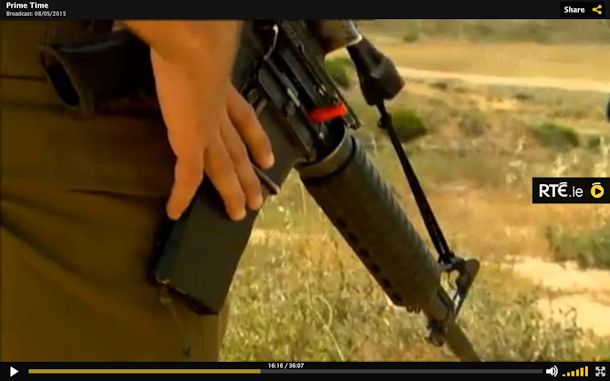
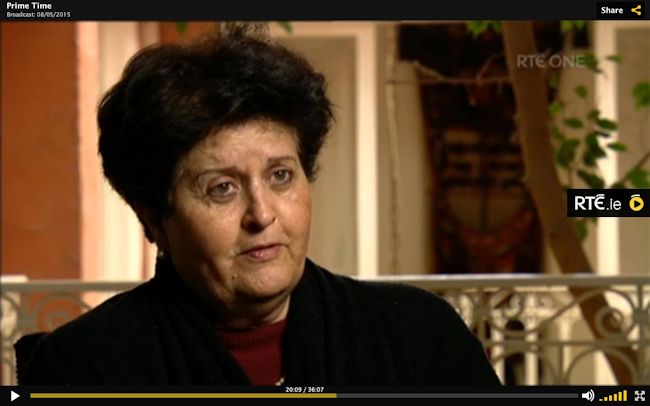
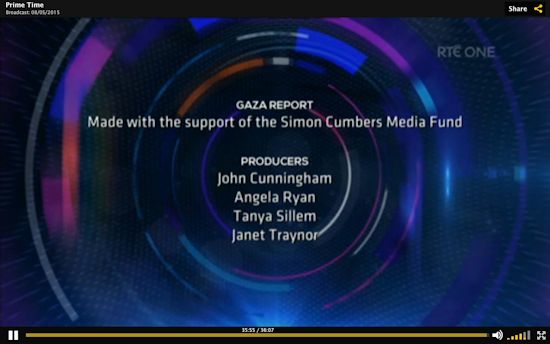

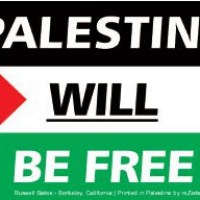

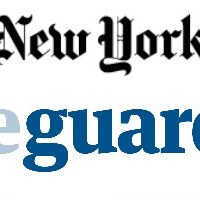





[…] article, titled ‘RTE’s Gaza news coverage sponsored by Irish Aid’s pro-Palestinian proxy’ details possible breaches of broadcasting code in Shortt’s […]